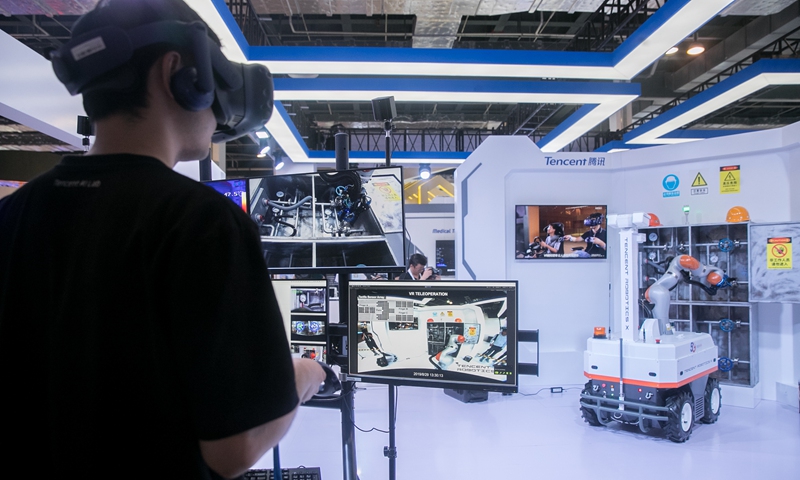Chinese AI start-up to continue lawsuit against Apple’s Siri
By GT staff reporters Source: Global Times Published: 2020/7/22 22:18:40

A staff member demonstrates 5G-based remote control of a robot during the 2019 World Artificial Intelligence Conference in Shanghai, Aug. 29, 2019. (Xinhua/Fang Zhe)
Shanghai-based artificial intelligent (AI) start-up Xiaoi Robot Technology Corp said it will continue its civil case against Apple over intellectual property infringement involving personal assistant Siri, after China's highest court ruled that the Chinese firm's related patent is valid, which means the case can advance from an administrative proceeding to a civil lawsuit.
A senior executive of Xiaoi told the Global Times Wednesday that the court ruling is "just the beginning," adding that Xiaoi will continue its infringement lawsuit against Apple.
The Supreme People's Court of China on June 29 made a verdict in favor of "Little i Robot" patent owned by Xiaoi, marking a partial end to an eight-year legal battle between the Chinese AI start-up and Apple. The patent owned by Xiaoi, filed in 2004 with the Chinese patent office, can intelligently perform AI functions such as personalized voice conversation. Users could also "order" the robot to help in information research and games playing.
Xiaoi claimed that Apple's Siri application falls into the regime of its patent protection and filed a lawsuit against Apple for patent infringement in June 2012. Siri debuted in 2011 when Apple launched iPhone 4S.
In response, Apple in November 2012 filed an invalidation request to the the Patent Reexamination Board of the State Intellectual Property Office against the patent. The PRB made a validity decision in 2013.
Apple then filed appeals twice, to the Beijing First Intermediate Court and Beijing High Court, with the first ruling validating and the second invalidating the patent. Xiaoi then appealed to the Supreme People's Court in 2015.
Zhao Zhanling, a senior analyst at the Center for IPR Studies at the China University of Political Science and Law, told the Global Times Wednesday that in legal cases involving patent infringement, the defendant usually files an invalidation request to invalidate the patent and make the case an administrative proceeding rather than civil litigation. "As the plaintiff does not own the right to the patents, then there is no such thing as patent infringement."
A source close to legal battle told the Global Times that as the case has been going for eight years, it means it may drag on.
Zhao noted that if the final civil decision rules that Apple has infringed the patent, the US tech company must compensate Xiaoi. Also, Apple needs to immediately stop infringing on the patent, meaning that some of Siri's functions may be suspended unless it pays patent fees to the Chinese firm.
"But so far in terms of the validity decision, there have not been any arguments or any judgment about whether Apple infringes that patent. The decision will not impact Apple's customers or the company's sales," the source noted.
Yuan Hui, founder, chairman and CEO of Xiaoi, told the Global Times Wednesday that the court decision that the Chinese firm's patent remains valid is "a big victory for Chinese companies to win patent rights against American tech giants."
Xiaoi has fought for the protection of intellectual property rights for eight years since 2012 and finally proved the strength of the Chinese company, Yuan said.
Newspaper headline: Domestic AI start-up to continue lawsuit against Apple’s Siri
Posted in: COMPANIES